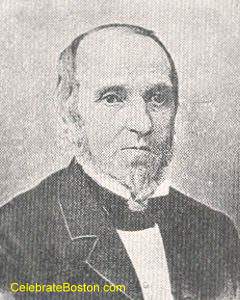 |
Mayor John Prescott Bigelow
Served 1849-1851
"Born in Groton, August 25, 1797; died July 4, 1872, served as Mayor during 1849-1851.
His administration has been characterized as one of 'marked ability and discretion.' The year prior to his election, the Mayor and Aldermen had refused to license the sale of intoxicating liquors. Mayor Bigelow said that the attempt to suppress the traffic in this way had utterly failed; and he recommended the re-establishment of the license system. The Mayor had the support of the grand jury, but when a test case in regard to licensing came up before the Board of Aldermen, the Mayor had not a single supporter. In spite of legal licenses, there was said to be 1,500 places where intoxicating liquors were sold, according to City Marshall Tukey.
Mayor Bigelow was opposed to the erection of a new county jail recommended by his predecessor, and for which contracts had been made. But the Aldermen decided to proceed with the work at a reduced expense. The building was completed in 1851 at an outlay, including the site, of about $450,000.
Mayor Bigelow, like his predecessor Quincy, realized that the high rate of taxation made necessary by diverse city projects induced many of the largest owners of personal property to escape into the country at the annual period of taxation. The evil has grown since that time in spite of attempts to check it by legislative enactment.
The national census of 1850 gave Boston's population as 136,881. The rapid growth was due to the opening of railroad communication with the West and steamship communication with the East. The valuation of all property within the city amounted to $180,000,500. The tax levy was $1,237,000, a rate of $6.80 a thousand; and the funded debt had increased to more than $6,000,000, including the water loans. Mayor Bigelow complained of the heavy burden the city had to bear, but the new work developed made it impossible to reduce the outlay.
In the last year of his administration, Mayor Bigelow was able to state that every section of the city was supplied with pure water. The entire cost of the water works amounted to $4,321,000. In the same year. a new almshouse on Deer Island was completed and the system of telegraphic fire alarms introduced.
One of the events under Mayor Bigelow was the attempt to break up a meeting in Faneuil Hall, called to receive George Thompson [abolitionist], then a member of the British parliament, on his arrival in this country. Another was the refusal of the Board of Aldermen to allow Faneuil Hall to be used for a reception in honor of Daniel Webster. The refusal was made on the ground that it might cause a disturbance and aroused intense indignation. The Common Council tried in vain to mend matters by inviting Daniel Webster to address his fellow citizens in Faneuil Hall at another time. The Mayor and Aldermen concurred later in this invitation. Politically, of course, the whole affair was a blunder, and all who had opposed Mr. Webster found themselves promptly relegated to private life.
The crowning event in Mayor Bigelow's career as head of the municipality was the completion of the railroad line connecting Boston with Canada and the Great Lakes. It was celebrated in September, 1851."
